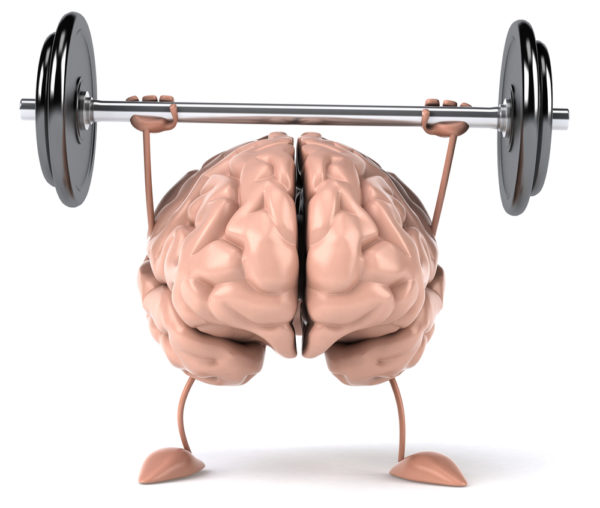The start of a new year means new resolutions and searching for ways to improve our health and quality of life. We all want to feel better and be the best version of ourselves that we can be. So often we focus on improving our bodies as an avenue to accomplishing these goals, but what about improving our minds? Your brain is your control panel. It stores your memories, helps you sense and perceive the world around you, tells your body how to move, cues you for how to feel, and gives you your unique personality. Your brain is YOU. We now know that the brain is capable of changing and improving at any age, and research is uncovering the best ways to stay sharp and keep your brain healthy.¹
Be a lifelong learner. Research shows that learning novel things and engaging in challenges may delay cognitive decline over the lifetime.² Exciting results have been found specifically with musical training. Music is a multi-sensory activity that uses concrete and abstract thought and engages a variety of brain areas. A 2013 study found that individuals aged 60-84 showed improved mood, attention, motor skills, visual scanning, and executive function after just four months of piano lessons.³
Get moving. Perhaps even more significant and universal across research is the importance of physical activity on brain function. A 2016 study found that individuals with little or no physical leisure activity showed significant decline in processing speed and memory when compared to those with moderate to heavy physical exercise habits.4 Regular aerobic activity is also associated with protecting the hippocampus, an area of your brain largely associated with memory. Exercise is also associated with cell creation and increased grey matter in the brain, which may fight the effects of age- related atrophy of brain tissue.5
Don’t worry. Be happy! Stress and depression have been associated negatively with generation of nerve cells in your brain.6 Chronic stress can cause memory impairment and has even been linked to increased risk of Alzheimer’s Disease in some research.7 Practicing meditation, mindfulness, and stress-relief techniques may help to protect your brain’s ability to continue to grow and flourish.
Socialize. Studies have shown that isolation and loneliness have negative effects on cognition. Social activity and social support have been linked to improved cognitive function and mood.8
Get Your Sleep. Numerous studies have shown that chronic sleep deprivation and fragmented sleep can decrease your brain’s ability to concentrate, create new memories, and use executive functioning skills. It can even cause inflammation in the brain and reduce your brain’s ability to form new cells.
So this year, be kind to your brain. Teach yourself a new skill. Learn ways to manage your anxiety. Spend time with your friends. Add some music to your life. Give your brain what it needs to grow and thrive! Contact us for a free consultation to help you live the healthiest life ever in 2019!
Happy New Year!

Courtney George is a licensed, registered occupational therapist with a passion for working with clients in their homes. Courtney has seven years of experience helping seniors age in place and working with those struggling with acute and chronic conditions to live meaningful and independent lives. Courtney found her passion while working as a personal caregiver during college as she pursued her psychology degree from the University of St. Thomas. She ultimately continued on to St. Catherine University, where she earned a Master of Occupational Therapy degree in 2013. She went on to experience a wide variety of therapy settings including inpatient, outpatient, and skilled nursing, but found most meaning in caring for clients in their homes.
Courtney is a native of Duluth, MN. She enjoys softball, golfing and is a long-time competitive curler. She is a lifelong learner and loves watching documentaries and keeping up-to-date with best health and wellness practices. She is a strong believer in prevention and loves the chance to educate others about ways to stay healthy and happy.
References
¹Shaffer, Joyce. “Neuroplasticity and Clinical Practice: Building Brain Power for Health.” Frontiers in Psychology (2016): 1118.
²Vemuri, P., Lesnick T. G., Przbelski S. A., Machulda M., Knopman D. S., Mielke M. M., et al. “Association of liftime intellectual enrichment with cognitive decline in the older population.” JAMA Neurology (2014): 1017-1024.
³Seinfeld S., Figueroa H., Ortiz-Gil J., Sanchez-Vives M. V. “Effects of music learning and piano practice on cognitive function, mood and quality of life in older adults.” Frontiers in Psychology (2013).
4Willey J. Z., Gardener H., Caunca M. R., Moon Y. P., Dong C., Cheung Y. K. et al. “Leisure-time physical activity associates with cognitive decline: the Northern Manhattan study.” Neurology (2016): 1-7.
5Erickson K. I., Voss M. W. Prakash R. S., Basak C., Szabo A., Chaddock L., et al. “Exercise Training Increases Size of Hippocampus and Improves Memory.” Proceedings of the National Academy of Sciences of the United States of America (2011): 3017-3022.
6Sheline Y., Sanghavi M., Mintun M., Gado M. “Depression but not Age Predicts Hippocampal Volume Loss in Medically Healthy Women with Recurrent Depression.” J. Neurosci (1999): 5034-5043.
7Justice, Nicholas. “Neurobiology of stress .” Neurobiology of Stress (2018): The Relationship Between Stress and Alzheimer’s Disease.
8Committee on the Public Health Dimensions of Cognitive Aging; Board on Health Sciences Policy; Institue of Medicine. Cognitive Aging: Progress in Understanding and Opportunities for Action. Washington DC: National Academies Press, 2015.
What makes us different? Our care comes to you!
View Our Service AreaWe Are A Comprehensive Mobile Company Focused on Wellness, Fitness, Rehabilitation, and Prevention
We specialize in transforming the lives of seniors, adults and teenagers with a wide array of diagnoses and conditions in their home or location of choice. You deserve to be your best self through good health and wellness. We would love to have the privilege to work with you or a loved one.
Request a FREE Consultation Today!
